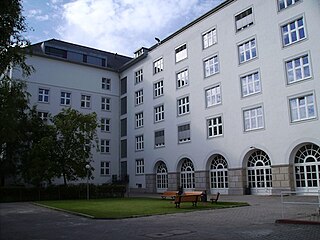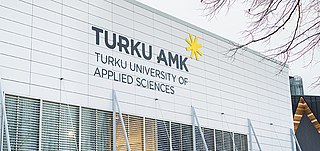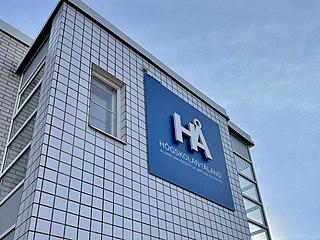Related Research Articles
A Fachhochschule, abbreviated FH, is a university of applied sciences (UAS), in other words a German tertiary education institution that provides professional education in many applied sciences and applied arts, such as engineering, technology, business, architecture, design, and industrial design.
Savonia University of Applied Sciences is a local municipality-owned Finnish institution of higher education based in the cities of Kuopio, Iisalmi and Varkaus.
Vaasa University of Applied Sciences popularly called VAMK, is an international higher education institution in Vaasa, Finland. VAMK educates Bachelors of Business Administration, Engineering, Hospitality Management and Social Services as well as Registered Nurses and Public Health Nurses in Finnish, Swedish and English for the demanding needs of the working life. It has approximately 3,300 students enrolled and a staff of circa 250 members.

Haaga-Helia University of Applied Sciences is one of Finland's largest universities of applied sciences. The institution is fully supervised and accredited by the Finnish government through the Ministry of Education and Culture. The university's primary facilities are in Pasila, Helsinki. It has other premises in Haaga, Malmi, and in Porvoo and Vierumäki.

The Faculty of Technical Sciences is a higher education institution located in Novi Sad, an independent part of the University of Novi Sad. It was founded on 18 May 1960 and today it is the largest faculty in Serbia by number of students and one of the largest in the region. As of 2020–21 academic year, it has a total of 15,742 students.

FH JOANNEUM is one of the biggest universities of applied sciences (UAS) in Austria. It has about 5,000 students and about 750 employees. The main campus is located in Graz and there are two additional locations in Kapfenberg and Bad Gleichenberg. All three are situated in the province Styria in Austria. FH JOANNEUM offers almost 70 degree programs in a variety of areas including business, technology, design, media, architecture, health and social services. The programmes are practice-oriented, project-based and interdisciplinary.

The Berlin School of Economics and Law, abbreviated as BSEL, is a public institution of higher education and research founded on 1 April 2009 through the merger of the Berlin School of Economics (BSE) and the FHVR Berlin. The BSEL portfolio provides a wide range of Bachelor's and Master's programmes in fields such as business, administration for the public and private sector, public security, law, or engineering. BSEL has an international approach with close working relationships to over 150 partner universities all over the world.

Oulu University of Applied Sciences (OAMK) (in Finnish: Oulun ammattikorkeakoulu (Oamk)) is a university of applied sciences in Oulu, Finland with approximately 9,000 students, including around 240 international degree students. The number of incoming exchange students annually is approximately 280.

The Seinäjoki University of Applied Sciences is a multidisciplinary non-profit government dependent higher education institution and an efficient actor in education and research, development and innovation (RDI) in the region of South Ostrobothnia in West Finland.

Metropolia University of Applied Sciences is the largest University of Applied Sciences in Finland. The university has four fields of study: culture, business, health care and social services, and technology. Teaching is also provided in English.
The Novia University of Applied Sciences is an institution of higher professional education in Finland. It offers Bachelor's and Master's degree programmes in Swedish in Vaasa, Turku, Raseborg and Jakobstad.

Centria University of Applied Sciences is a private-recognized higher education institution in Finland.

Turku University of Applied Sciences is a multidisciplinary higher education institution, located in the city of Turku and Salo in the Southwest Finland. The institute began operations as a temporary polytechnic in autumn 1992. Before 2006-01-10, the institution carried the English name of Turku Polytechnic.

Åland University of Applied Sciences is a university of applied sciences in Mariehamn, Åland. It is housed in three different buildings, the North building, the Western Building and the South Building. It has approx. 550 full-time students, mainly from Åland and Sweden. The number of employees is around 60. Åland UAS is maintained by the Government of Åland. It is the only higher education institution in the Åland Islands. The education in the Åland University of Applied Sciences is conducted in Swedish.

Jamk University of Applied Sciences is a university of applied sciences in Finland, in the region of Central Finland. Jamk offers a wide variety of degree programmes in both Finnish and English as well as opportunities for open studies that students can complete either online or on campus, depending on the course. Working life-oriented research, development and innovation (RDI) work is one of the basic tasks of Jamk as a University of Applied Sciences.
Rovaniemi University of Applied Sciences was a university of applied sciences in Rovaniemi, Finland.

The Estonian Information Technology College (EITC) was a private non-profit institution of professional higher education in Estonia, located in Tallinn. EITC provided Estonian applied higher education diploma-level education in information technology in four main programmes, carried out shorter-term vocational training programmes as well as various R&D-oriented activities. In 2017 it merged with the Tallinn University of Technology.
Lapland University of Applied Sciences, in short Lapland UAS, is a Finnish polyethnic university located in the cities of Kemi, Tornio and Rovaniemi. It was founded on January 1, 2014 as a merger between Rovaniemi University of Applied Sciences and Kemi-Tornio University of Applied Sciences. The merger carried over all the features of the previous organizations in an expanded organization form.

University of Applied Sciences Jena (UAS Jena) (German: Ernst-Abbe-Hochschule Jena (EAH Jena)) was founded on 1 October 1991 as one of the first institutions of higher education of its kind in the newly founded federal states of Germany. Since the beginning of summer semester 2012, it bears the name of the entrepreneur Ernst Abbe. The university is characterized above all by its high practical orientation and research strength. Their slogan is: Innovation for quality of life. Health, precision, sustainability & networking!
The UNESCO King Hamad Bin Isa Al-Khalifa Prize for the Use of Information and Communication Technologies (ICT) in Education is a UNESCO prize which rewards projects and programmes of individuals, institutions, other entities or non-governmental organizations for the creative use of information and communication technologies to enhance learning, teaching and overall education performance.
References
- ↑ "UNESCO Prize to Kemi-Tornio UAS". Archived from the original on 2007-01-16. Retrieved 2020-02-15.
{{cite web}}: CS1 maint: bot: original URL status unknown (link)